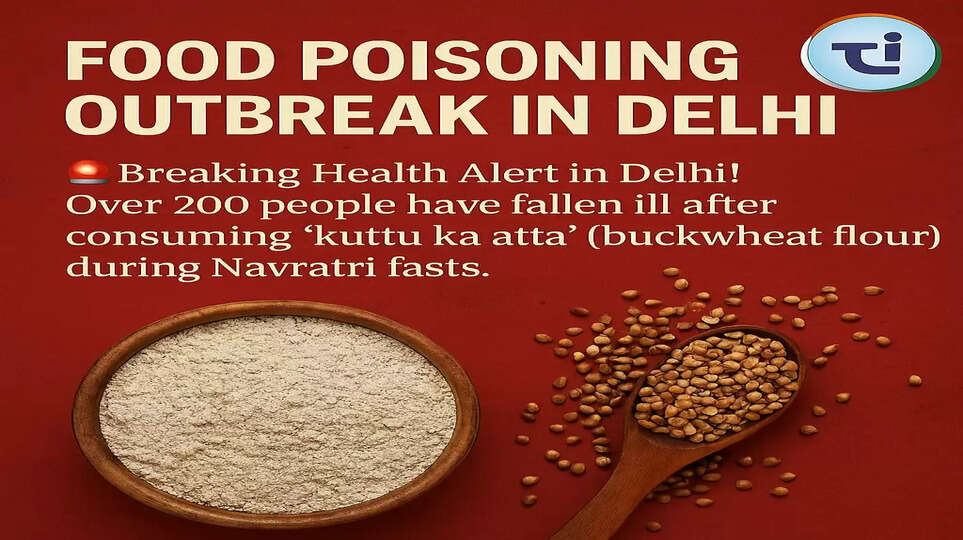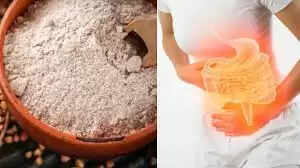Delhi Food Poisoning Incident: Over 200 People Fall Ill After Eating Contaminated Buckwheat Flour During Navratri
In Delhi, over 200 people fell ill during Navratri after consuming contaminated buckwheat flour. Health authorities launch investigation to ensure food safety.

Introduction: Navratri Festivities Marred by Food Poisoning
What should have been a period of devotion and fasting turned into a health crisis in Delhi. During Navratri celebrations, over 200 people fell ill after consuming contaminated buckwheat flour (kuttu ka atta). The incident has sparked concern over food safety standards in India, especially during festivals when demand for fasting-friendly products surges.
What Happened in Delhi?
Reports of Illness
Hospitals across Delhi reported a sudden rise in patients with symptoms of food poisoning linked to buckwheat flour.
Symptoms Experienced by Victims
Those affected complained of vomiting, diarrhea, stomach cramps, nausea, and dehydration.
Immediate Response from Authorities
Local authorities rushed to hospitals, collected food samples, and initiated an urgent investigation into food adulteration.
Buckwheat Flour and Its Use During Navratri
Why Buckwheat is Popular During Fasting
Buckwheat flour is one of the most consumed grains during Navratri fasting. It is gluten-free, filling, and aligned with traditional fasting rules.
Nutritional Benefits
It is rich in fiber, protein, iron, and magnesium, making it a healthy substitute for wheat.
Risks of Contamination
Due to high demand during festivals, unscrupulous suppliers may mix low-quality ingredients or store flour improperly, increasing risks of contamination.
The Scale of the Incident
Number of People Affected
Over 200 individuals across different neighborhoods reported illness.
Areas in Delhi Hit the Hardest
Localities with high consumption of street-side Navratri foods were most impacted.
Hospital Admissions and Medical Care
Many patients required intravenous fluids and observation, though no fatalities were reported.

Investigations Launched
Food Safety Department’s Role
The Delhi Food Safety Department began inspections at wholesale and retail outlets.
Sample Testing and Findings
Preliminary tests suggest fungal contamination or adulteration in buckwheat flour batches.
Identifying the Source of Contamination
Authorities are tracing the supply chain from flour mills to retailers to identify the source.
Common Causes of Food Contamination in India
Poor Storage and Handling
Moisture, humidity, and unhygienic storage practices often spoil grains.
Adulteration in Food Supply Chains
Some suppliers add starch, husk, or cheap substitutes to increase profit margins.
Lack of Consumer Awareness
Many consumers don’t check certifications or expiry dates, making them vulnerable.
Government Measures to Ensure Food Safety
Stricter Regulations for Navratri Foods
The government is considering mandatory checks on fasting-related food products.
Crackdowns on Food Adulteration
Regular inspections and penalties for vendors selling contaminated flour are being enforced.
Raising Public Awareness
Health departments are urging consumers to buy branded, certified products.
Impact on Public Sentiment During Navratri
Religious and Cultural Importance of Safe Food
For millions of Hindus, fasting during Navratri is both spiritual and cultural, making this incident especially shocking.
Shock Among Devotees
Many expressed anger and disappointment, calling for stricter regulation of festive foods.
Rising Concerns About Food Vendors
Trust in street vendors and local flour sellers has been shaken.
Preventive Steps for Consumers
Checking Labels and Certification
Always purchase flour that has an FSSAI mark and sealed packaging.
Proper Storage and Hygiene
Keep buckwheat flour in dry, airtight containers to prevent fungal growth.
Cooking Buckwheat Flour Safely
Thorough cooking can kill certain contaminants, reducing health risks.
Role of Media and Social Platforms
Highlighting Food Safety Concerns
News coverage has played a vital role in spreading awareness of the risks.
Spreading Awareness During Festivals
Social media campaigns encourage devotees to prioritize safety over price.
Holding Authorities Accountable
Media scrutiny pushes regulators to act against food adulteration.
Expert Opinions on Food Safety Standards
Nutritionists’ Warnings
Experts stress that unbranded festival foods often carry higher risks.
Doctors’ Recommendations
Medical professionals urge people to seek treatment immediately if symptoms appear.
Policy Experts on Strengthening Food Laws
Analysts call for stringent festival-time checks on all food supplies.
Future Implications of the Incident
Need for Stronger Food Regulations
The episode highlights the need for robust monitoring mechanisms.
Rebuilding Trust Among Consumers
Branded and certified food suppliers must work harder to regain consumer trust.
Ensuring Safety in Festival Foods
Strict inspections during festivals will help ensure safe and authentic fasting food products.
FAQs on Delhi Buckwheat Flour Food Poisoning
Q1: What caused the food poisoning in Delhi?
A1: Contaminated buckwheat flour consumed during Navratri is suspected as the cause.
Q2: How many people were affected?
A2: Over 200 people reported symptoms of food poisoning.
Q3: What symptoms did victims experience?
A3: Common symptoms included vomiting, diarrhea, stomach cramps, and dehydration.
Q4: What steps are authorities taking?
A4: The Food Safety Department is testing samples, inspecting vendors, and tracing supply chains.
Q5: How can consumers avoid such incidents?
A5: By purchasing branded, certified products, storing flour properly, and avoiding unverified sources.
Q6: Why is buckwheat flour risky during festivals?
A6: Its high demand during Navratri leads to bulk storage, poor handling, and potential adulteration.
Conclusion: A Wake-Up Call for Food Safety in India
The Delhi buckwheat flour poisoning incident is a reminder of the urgent need for stricter food safety standards. With festivals like Navratri carrying deep religious significance, contaminated food not only threatens health but also impacts cultural traditions. Strengthened laws, vigilant monitoring, and consumer awareness are crucial to prevent such episodes in the future.
